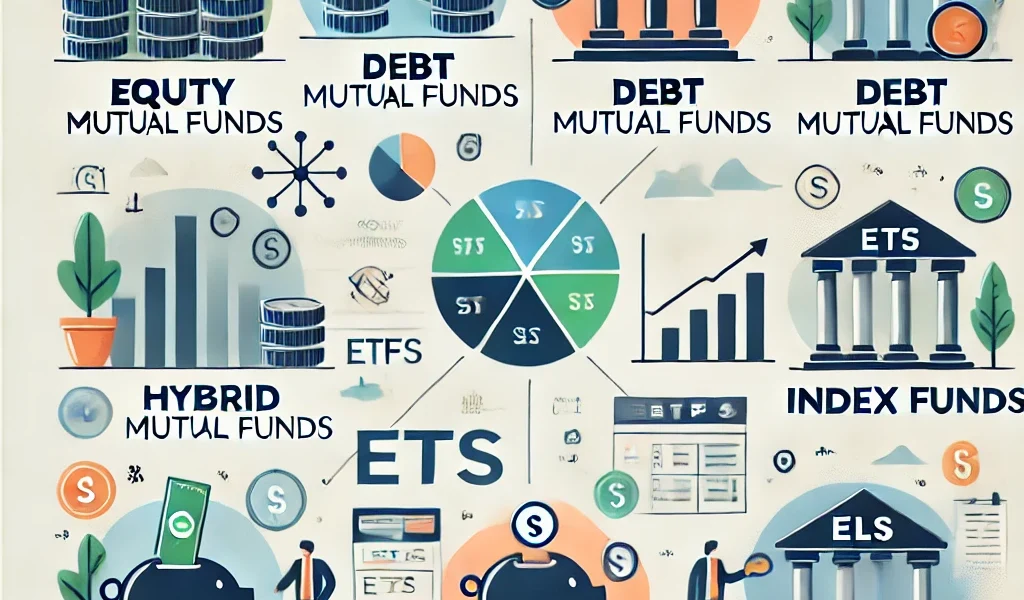Mutual funds are a popular investment vehicle that pools money from multiple investors to invest in a diversified portfolio of stocks, bonds, or other securities. Whether you’re new to investing or have some experience, understanding the different types of mutual funds is essential to make informed investment decisions.
1. Equity Mutual Funds
Equity mutual funds primarily invest in stocks of various companies, making them a high-risk, high-reward investment. These funds aim to provide capital appreciation over the long term by investing in both large-cap and mid-cap companies across different sectors. Since they are directly linked to the stock market, their value can fluctuate significantly, especially in the short term.
Best for: Investors with a high-risk tolerance and a long-term investment horizon looking to build wealth over time.
Popular Categories:
- Large-Cap Funds: Invest in established companies with a large market capitalization.
- Mid-Cap Funds: Invest in medium-sized companies with growth potential.
- Small-Cap Funds: Focus on emerging companies, which come with higher risk but significant growth potential.
2. Debt Mutual Funds
Debt mutual funds invest in fixed-income securities like government bonds, corporate bonds, and treasury bills. These funds are less volatile compared to equity funds and provide more stable returns. They are a great option for conservative investors who prioritize safety and steady income over high returns.
Best for: Risk-averse investors or those looking for regular income and capital preservation.
Popular Categories:
- Corporate Bond Funds: Invest in bonds issued by companies.
- Government Bond Funds: Invest in government securities with low risk.
- Liquid Funds: Invest in short-term debt instruments and provide high liquidity.
3. Hybrid Mutual Funds
Hybrid mutual funds, also known as balanced funds, invest in a mix of both equity and debt instruments. The aim is to offer the best of both worlds – growth potential from equities and stability from debt. These funds are ideal for investors who want to take advantage of equity returns while mitigating risk through debt exposure.
Best for: Investors seeking balanced risk and returns, typically with a moderate risk tolerance.
Popular Categories:
- Aggressive Hybrid Funds: A larger portion of the portfolio is invested in equities.
- Conservative Hybrid Funds: A larger portion is invested in debt, with a smaller portion in equities.
4. Index Funds
Index funds are a type of mutual fund that aim to replicate the performance of a specific market index, like the Nifty 50 or the S&P 500. These funds invest in the same companies that are part of the chosen index. Since they follow a passive investment strategy, index funds generally have lower management fees and are ideal for investors seeking broad market exposure without the need for active management.
Best for: Long-term investors looking for low-cost, diversified exposure to the stock market.
5. Exchange-Traded Funds (ETFs)
ETFs are similar to index funds but are traded on stock exchanges like individual stocks. They combine the diversification of mutual funds with the liquidity of stocks. ETFs are ideal for investors who want flexibility and ease of buying and selling throughout the trading day.
Best for: Investors looking for flexibility, lower expense ratios, and easy access to various markets.
6. Sector-Specific Funds
Sector-specific funds invest in specific industries, such as technology, healthcare, or energy. These funds are more volatile due to their concentrated exposure to one sector. However, they can provide excellent returns when the sector performs well.
Best for: Investors who have strong knowledge of certain industries and want to capitalize on sectoral growth.
7. Tax-Saving (ELSS) Funds
Equity Linked Savings Scheme (ELSS) funds are a type of equity mutual fund that provides tax benefits under Section 80C of the Income Tax Act. ELSS funds have a lock-in period of three years, making them an excellent choice for tax-saving and long-term capital appreciation.
Best for: Investors looking to save taxes while investing in equities for long-term growth.
Which Mutual Fund Is Right for You?
Choosing the right mutual fund depends on your financial goals, risk tolerance, and investment horizon. Here are a few factors to consider:
- Risk Tolerance: Equity funds are riskier but offer higher potential returns, while debt funds are safer but offer more moderate returns.
- Investment Horizon: If you are investing for the long term, equity and hybrid funds might be suitable. For short-term goals, debt funds and liquid funds may be better.
- Tax Considerations: If tax-saving is a priority, consider ELSS funds.
Conclusion
Mutual funds offer a wide range of investment options to suit different financial goals. By understanding the types of mutual funds, you can build a diversified portfolio that aligns with your risk profile and financial objectives. Remember to research thoroughly or consult with a financial advisor before making any investment decisions.




